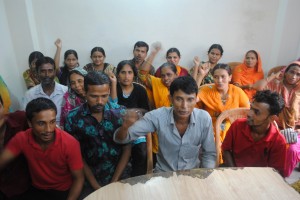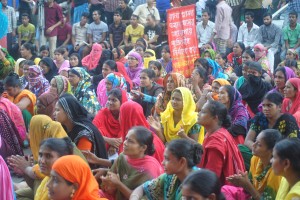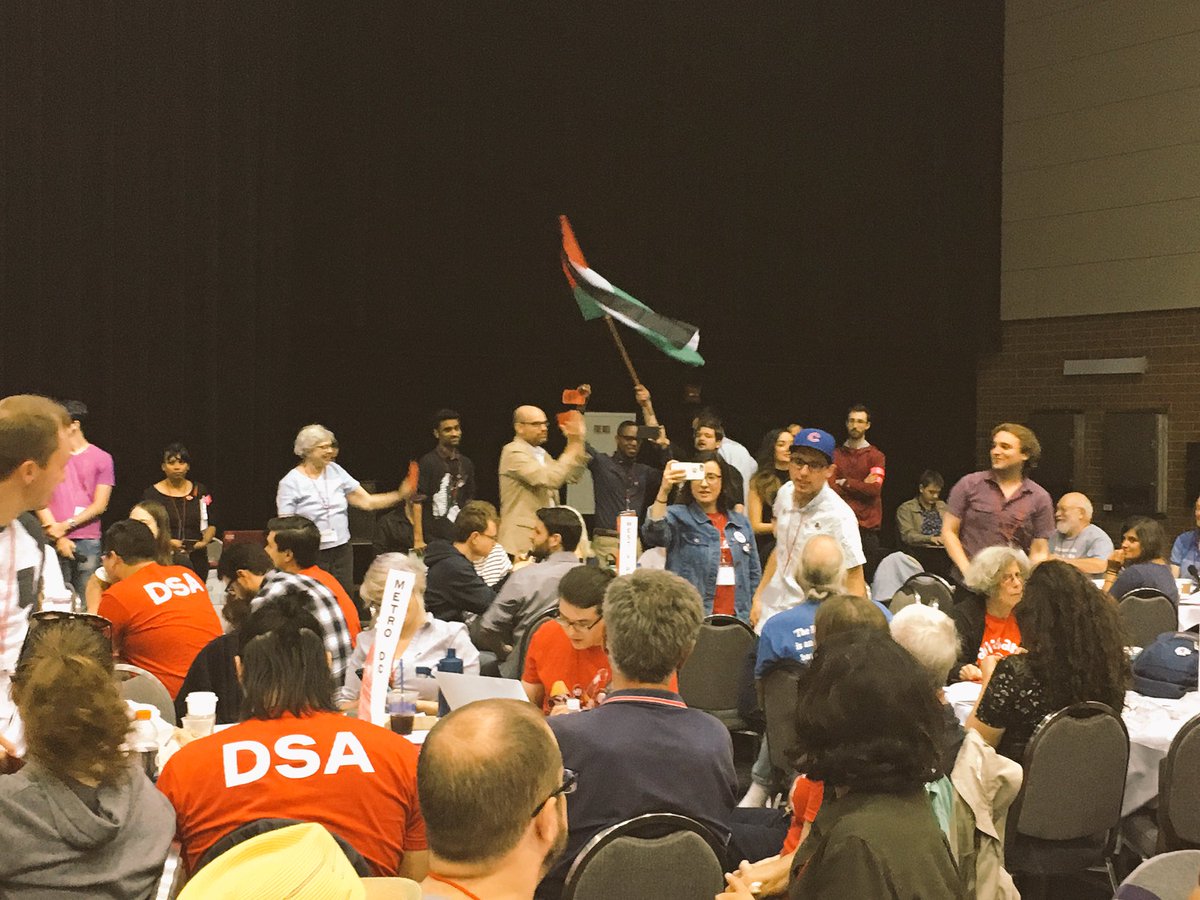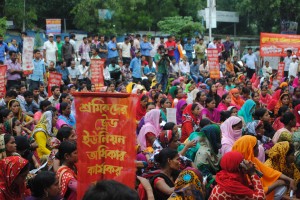
“We are building a national, democratic workers’ rights movement” explains Moshrefa Mishu, Garment Workers Unity Forum (GWUF), on their recent campaign by Tuba Group workers for their wages and benefits that has led to street protests, hunger strikes, and being on the receiving end of violence by police.
“Our movement is not over.”
She continues countering the naysayers: “The workers’ have shown an aspiration to realize greater workers’ rights, and we want to spread this aspiration to all workers in Bangladesh.”
Ms. Mishu’s rejection of the Tuba Group workers wage strike as one being parochial and pertaining to one factory owner was echoed by workers’ themselves. Chanting for all workers to struggle and to be united, workers spoke of the challenges of their movement.
Since May, the garment workers of five factories owned by Delwar Hossain, the same owner of Tazreen Fashions where a factory fire resulted in the deaths of at least 112 workers, have been struggling for their owed wages and benefits. Earlier, in February of this year, the court brought formal charges against Hossain for homicide, and he remained in jail until he was released on bail on August 6. Incredibly, the reason given for the bail was so that he could pay the workers wages owed. He remains out on bail.
From July 28, about 1,600 workers from five factories of the Tuba Group went on an 11-day hunger strike demanding the payment of salary for three months of work, overtime and an Eid holiday bonus. While the workers eventually received three months pay from the garment workers trade association – BGMEA, Hossain closed his five factories thereby resulting in the loss of jobs of 1,600 workers. At present, workers are still owed an Eid bonus, vacation pay and termination benefits. Using a section of the Bangladesh labor law that allows employers not to pay wages in the event of an “illegal strike”, Hossain is now seeking to escape from paying mandated termination benefits. This issue will be decided in the courts. GWUF will continue to use the legal channels, as well as continue with organizing. Just recently, GWUF announced its intention to pressure the Labor Ministry if the workers demands are not met and to continue its demonstrations.
In the absence of any financial safety-nets like unemployment insurance or a strike fund, workers are taking some heart-wrenching measures to survive including from eating one meal a day, borrowing money from friends or taking high interest personal loans. One worker aptly named Hero sent his family back to his rural village where expenses are less, so that he could look for work.
Anwar Meeta Hero
Another worker, Meeta, explained that she was forced to pull her child from school because she did not have money to pay the tuition. She said she felt humiliated because she was being penalized for only asking for what she is owed by law. Because none of the workers received a bonus for the Muslim religious holiday, Eid, after the holy month of fasting, many families were unable to celebrate the holiday with joy. Workers reported that they are being blacklisted from jobs once employers learn they worked at Tuba factories. In essence, they feel like they are being penalized for fighting for their legal rights.
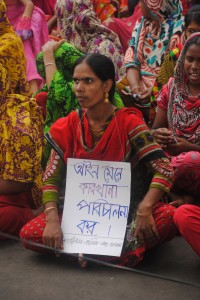
Despite a constitutional provision requiring the Government of Bangladesh to “emancipate the toiling masses the peasants and workers … from all forms of exploitation” it has been woefully derelict in its obligation to the workers. Instead, it has used its police to violently disperse workers engaged in a peaceful hunger strike.
The story that unfolds beginning from May of this year to the present closure of the factories that has made 1,600 workers unemployed may not seem to have a positive ending. Obtaining the wages successfully came with serious consequences to the workers including police use of excessive force, including rubber bullets, tear gas, pepper spray and batons.
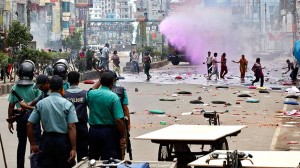
I sat down with workers in the movement to understand what are the next steps and how can those sympathetic to their cause show solidarity.
When asked about the future of the movement, Anwara says: “what can I tell you about my vision for the movement. I don’t have the language for that. My life is filled with sorrow. At such a young age, my life seems over. I am unemployed. “
Yet, in the midst of this dire economic reality, she regularly comes to the GWUF office, the hub of organizing, and volunteers. She continues to struggle, and hope that workers can unite, and she can work and support her family with dignity.”
Next to her, her co-worker Asma remarks and Anwara nods in agreement: “We must struggle so that we can live, and earn a wage to live. Through struggle and organizing, we can overcome our tragedies.” Asma was injured by a rubber bullet, yet she continues in the movement.
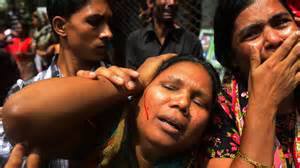
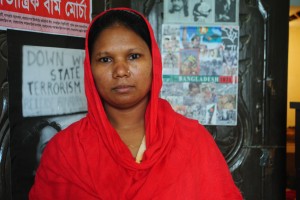
I realized afterwards that my question to them, albeit in Bengali, was seriously flawed not due to translation, but in its conception, and one that perhaps plagues others observing and analyzing the Tuba workers struggle. To ask for a future vision of the movement disconnected from the present reality is a luxurious exercise in abstraction, and one that is not based on the current lived socio-political reality of workers. It is only through their struggle and engagement can a “language” emerge and a newer democratic reality for workers be imagined. It is not that Anwara, due to her lack of formal education does not have a “language” to express a vision, but because whatever is articulated will be limited by the present socio-economic reality. In that way, the vision for greater rights cannot yet be imagined under such state and economic repression. However, that such a reality in whatever form cannot be actualized without organizing and unity is abundantly clear from the worker interview and their actions. In this regard, Anwara’s statement, that she does not have a “language” is in fact an intellectually honest, and theoretically astute comment.
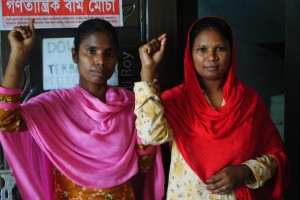
Solidarity worker ally and organizer Azad captures this poetically by saying “unless we realize a state that loves its workers, we cannot have a democratic labor movement.’
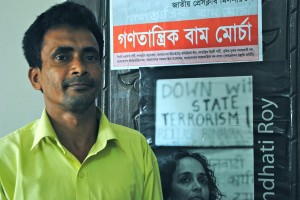
Evaluating workers’ movements based on some demonstrable goal or product – like the wages obtained – only seeks to reduce the aspirations of workers to the present reality and that which is allowed under existing law. Such an evaluation is hardly visionary. In fact, the reforms to Bangladesh’s labor law leave much to be desired, as reported by Bangladesh Institute for Labor Studies in 2010 and in a 2013 statement by the International Labor Organization (ILO).
Instead, we ought to seek for glimpses and gestures of a broader vision in the present struggles.
Workers in Bangladesh struggle for basic benefits under severe repressive conditions that many of us in the United States take for granted; yet, they continue to struggle knowing full well the consequences to fighting back. This unstoppable desire to speak up for what is right despite the consequences is inspiring. This clearly articulated desire coupled with the unity of workers is what prompts me to take notice of the Tuba struggle seriously, as one that promises as Mishu states, “a democratic labor movement.” For this same reason, I think that civic and labor leaders in Bangladesh, and globally should take notice of the Tuba Workers’ struggle, and lend their support.
With the closure of the factory, the struggle has reached a critical point, and one where we can provide solidarity and support. When asked how those who are aligned with workers’ issues can show support, Md. Khokon invited us all around the world, and in particular Bangladeshis, to stage a protest or a solidarity action so that they know they are not alone in their struggle.
Uniformly, workers spoke about the need for emotional and moral support. Asma asks that wherever you are join our struggle because change will not happen if we remain quiet.
Even after all that the Tuba workers have gone through, Asma said, “If needed, we will stand by you when you need us because we do not want you to suffer as we did. ”
Organizers also spoke about how low-wage workers to highly paid professionals have contributed time and finances to support the Tuba Group workers’ struggle. Their contributions have shown them an investment and interest from the Bangladeshi civil society to want to see the movement succeed. It is time now for us to broaden the base of the support so that workers know that they are not fighting for labor rights alone.

